
- Homepage
- Brand
- Alkota (77)
- Author Doll (38)
- Bestpysanky (28)
- Buyrussiangifts (47)
- Ceprueb Nocag (21)
- Fedoskino Style (15)
- Firebird (17)
- Firebirdworkshop (33)
- Greatrussiangifts (25)
- Hand Painted (14)
- Handmade (922)
- Handmadfe (53)
- Matryoshka (48)
- Nesting Dolls (35)
- Nestingdollsstore (22)
- Russian (50)
- Russian Nesting Doll (16)
- Semenov (18)
- Sergiev Posad (34)
- Unknown (19)
- ... (4811)
- Doll Size
- Ethnicity
- Sport
- Team
- Type
- Action Figure (7)
- Art Toy (4)
- Artist Doll (5)
- Charm(s) (13)
- Doll (24)
- Dolls (4)
- Fashion (5)
- Figure (4)
- Figurine (6)
- Hand Painted (55)
- Lacquer Box (17)
- Light Sculpture (3)
- Matryoshka Dolls (3)
- Nesting (346)
- Nesting Doll (954)
- Nesting Dolls (15)
- Russian (7)
- Russian Dolls (31)
- Set (6)
- Standard (3)
- ... (4831)
Soviet Russian leader Babushka nesting 10 dolls Putin Yeltsin Gorbachov Brezhnev
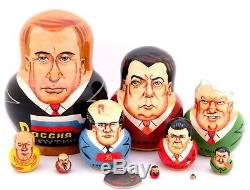
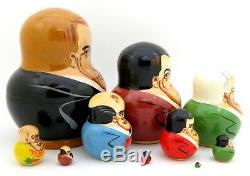
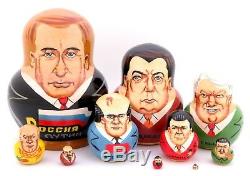
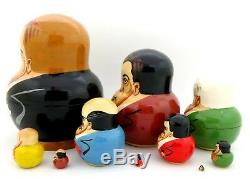
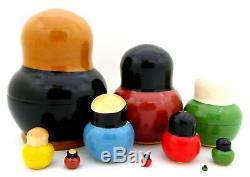
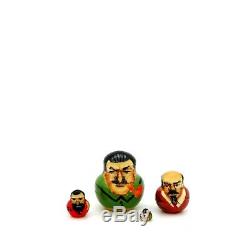
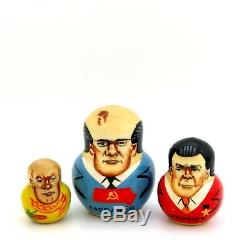
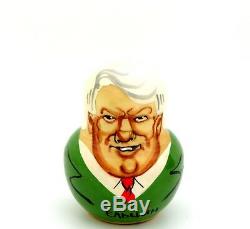
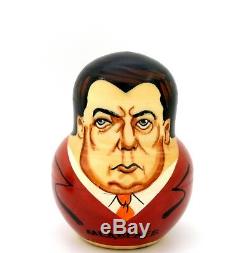
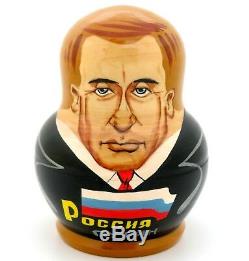
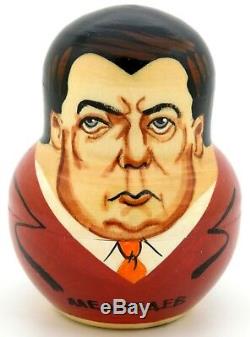
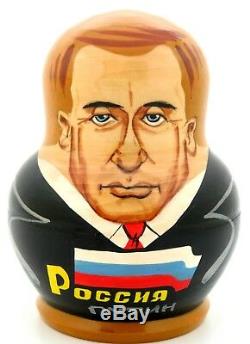


Set of 10 Russian nesting. Made to order by The Russian Artist.
The largest doll is 11.5 cm (4 1/2 inches) tall. (born 7 October 1952) is a Russian politician and former intelligence officer serving as President of Russia since 2012, previously holding the position from 2000 until 2008. In between his presidential terms he was also the Prime Minister of Russia under his close associate Dmitry Medvedev. Putin was born in Leningrad during the Soviet Union.
He studied law at Leningrad State University, graduating in 1975. Putin was a KGB foreign intelligence officer for 16 years, rising to the rank of Lieutenant Colonel before resigning in 1991 to enter politics in Saint Petersburg. He moved to Moscow in 1996 and joined President Boris Yeltsin's administration, rising quickly through the ranks and becoming Acting President on 31 December 1999, when Yeltsin resigned.
During his first presidency, the Russian economy grew for eight straight years, and GDP measured in purchasing power increased by 72%. The growth was a result of the 2000s commodities boom, recovery from the post-Communist depression, financial crises, prudent economic and fiscal policies. In September 2011, Putin announced he would seek a third term as president. He won the March 2012 presidential election with 64% of the vote. Falling oil prices coupled with international sanctions imposed at the beginning of 2014 after Russia's annexation of Crimea and military intervention in Eastern Ukraine led to GDP shrinking by 3.7% in 2015, though the Russian economy rebounded in 2016 with 0.3% GDP growth and is officially out of the recession.
Putin gained 76% of the March 2018 presidential vote and was re-elected for a six-year term that will end in 2024. (born 14 September 1965) is a Russian politician who has served as the Prime Minister of Russia since 2012. From 2008 to 2012, Medvedev served as the third President of Russia.
Regarded as more liberal than his predecessor and later successor as president, Vladimir Putin (who was also prime minister during Medvedev's presidency), Medvedev's top agenda as president was a wide-ranging modernisation programme, aiming at modernising Russia's economy and society, and lessening the country's reliance on oil and gas. During Medvedev's tenure, Russia emerged victorious in the Russo-Georgian War, and recovered from the Great Recession.Medvedev initiated a substantial law enforcement reform and launched an anti-corruption campaign, despite having been accused of corruption himself. (1 February 1931 23 April 2007) was a Soviet and Russian politician and the first President of the Russian Federation, serving from 1991 to 1999. Originally a supporter of Mikhail Gorbachev, Yeltsin emerged under the perestroika reforms as one of Gorbachev's most powerful political opponents. During the late 1980s, Yeltsin had been a candidate member of the Politburo, and in late 1987 tendered a letter of resignation in protest.
No one had resigned from the Politburo before. This act branded Yeltsin as a rebel and led to his rise in popularity as an anti-establishment figure.
On 29 May 1990, he was elected the chairman of the Russian Supreme Soviet. On 12 June 1991 he was elected by popular vote to the newly created post of President of the Russian Soviet Federative Socialist Republic (RSFSR).
Upon the resignation of Mikhail Gorbachev and the dissolution of the Soviet Union on 25 December 1991, the RSFSR became the sovereign state of the Russian Federation, and Yeltsin remained in office as president. He was reelected in the 1996 election, in which critics widely claimed pervasive corruption; in the second round he defeated Gennady Zyuganov from the revived Communist Party by a margin of 13.7%.
However, Yeltsin never recovered his early popularity after a series of economic and political crises in Russia in the 1990s. Was born in Stavropol Krai, Russia in 1931. He joined and became very active in the Communist party while at Moscow State University and also graduated with a law degree.
By 1979 he had become a candidate member of the Politburo and in 1985 he became the leader of the Soviet Union after Chernenko's death. Gorbachev engaged in a race to amass nuclear weapons in space with the United States, which proved costly for the suffering Soviet economy. Gorbachev managed to end the costly Soviet war in Afghanistan in 1987. He worked to provide more freedoms and reforms to the Soviet people with his policies of glasnost and perestroika (openness and restructure). In 1989 Gorbachev organized elections to require Communist Party members to run against non-members to make a more democratic electoral system.
He also removed the Communist Party's constitutional role in governing the state, which inadvertently led to the dissolution of the Soviet Union. This fact was in spite of Gorbachev wanting to keep the Soviet Union together.
By 1990 Gorbachev was grappling with different groups waging war and demanding independence, along with a sputtering Soviet economy. In 1991 Gorbachev's rival Boris Yeltsin was elected President of the Russian Republic and was pushing radical changes to the economy. By the end of December of 1991, the Soviet Union had completely crumbled, and Gorbachev stepped down and gave Yeltsin complete power over Russia.
Was born in Kamianske, Ukraine in 1906, which was then part of the Russian Empire. He joined the Komsomol (political youth organization) in 1923 and in 1929 became a full member of the Communist party. Brezhnev fought in World War Two, reaching the rank of major general and in 1952 became a member of the Central Committee. Brezhnev took over as the leader for Khrushchev and ended his cultural reforms by clamping down on the cultural freedom and he gave the KGB back some of their former powers they had under Stalin. The Soviet economy grew under Khrushchev at a rate that was on pace to catch up with America but by the mid-1970's entered an era of stagnation and never recovered. Brezhnev also built up the Soviet Union's military at the cost of their economy. During the 1970's Brezhnev pursued a policy of detente with the West trying to normalize relations but the Soviet's costly decision to invade Afghanistan in 1979 ended the detente policy. In his last few years, Brezhnev's health deteriorate, and he was mostly a figured head. Was born in Kalinovka, Russia.In 1918, Khrushchev joined the Communist Party and fought in the Red Army. Khrushchev rose quickly through the ranks of the Communist Party during the 1930's and 40's. Shortly after taking over the leadership of the Soviet Union from Malenkov, Khrushchev gave a speech where he denounced the excesses under Stalin. This speech was the start of his policy of de-Stalinization, which resulted in protests in Poland and Hungary that were put down. Khrushchev relaxed restrictions on free expression, released political prisoners and launched bold but ultimately unattainable agricultural goals.
He largely tried to pursue a policy of peaceful coexistence with the West but at the same time started the Cuban Missile Crisis and started construction on the Berlin Wall. Poor economic growth, deteriorating relations with China and other issues eventually led to Khrushchev being ousted from power by "retiring" due to his health. Khrushchev spent his remaining years at his estate, dying in 1971.
Lenin's warning in his final years about the unchecked power of party members went unheeded, however, and this led to a power struggle for control following his death, Joseph Stalin was born in Gori, Georgia in 1878, which was then a part of the Russian Empire. Like Lenin, Stalin was in exile leading up to the Russian Revolution.
Stalin then helped shape the young Soviet Union through the resulting Russian Civil War, Polish-Soviet War and the invasion of Georgia. During this period Stalin clashed with Lenin and other Soviet Leaders over ideology, strategy, and his violent tendencies. After Lenin's death Stalin accumulated power, eventually become the unquestioned leader by 1929.
Stalin then spent years leading up to World War Two pushing his economic policy of Collectivization and trying to industrialize the country. Stalin also spent this time purging, executing and deporting his enemies to Siberia. The Soviets and the Germans signed a non-aggression pact and agreed to split up Eastern Europe but then Hitler violated it and invaded the Soviet Union. Stalin led the Soviet Union to victory in World War Two over Germany.
Stalin took control of Eastern Europe after World War Two and established the Soviet Bloc. Relations with the West deteriorated and the Cold War started in 1947. Stalin died a few years later in 1953.
Was born in Ulyanovsk, Russia, in 1870. He founded the Communist Party in 1912, but he spent years leading up to the Russian Revolution in exile abroad before Germany arranged for him to go back to Russia to get them out of World War One. From there Lenin led the October Revolution to overthrow the provisional government that had overthrown the monarchy during the February Revolution. Lenin and the Communists then quickly consolidated power and eventually won the Russian Civil War (1917-22). Lenin then spent the last few years of his life trying to shape the future of the Soviet Union.
A must have for Russian lovers and it would make an amazing and unique gift for any Occasion!!! All my dolls fit inside one another!!
We speak French, English, German and Russian. Please leave feedback once you have received the item so that I know it has arrived safely. I will leave feedback in return.Smoke & Pet Free Item. Powered by SixBit's eCommerce Solution. The item "Soviet Russian leader Babushka nesting 10 dolls Putin Yeltsin Gorbachov Brezhnev" is in sale since Thursday, November 8, 2018. This item is in the category "Dolls & Bears\Dolls, Clothing & Accessories\Russian Dolls".
The seller is "tom3burma" and is located in norwich, Norfolk. This item can be shipped worldwide.
- Brand: Handmade
- Country/Region of Manufacture: Russian Federation
- Features: Handmade
- Doll Size: 4 1/2 in
- Number of Pieces: 10

